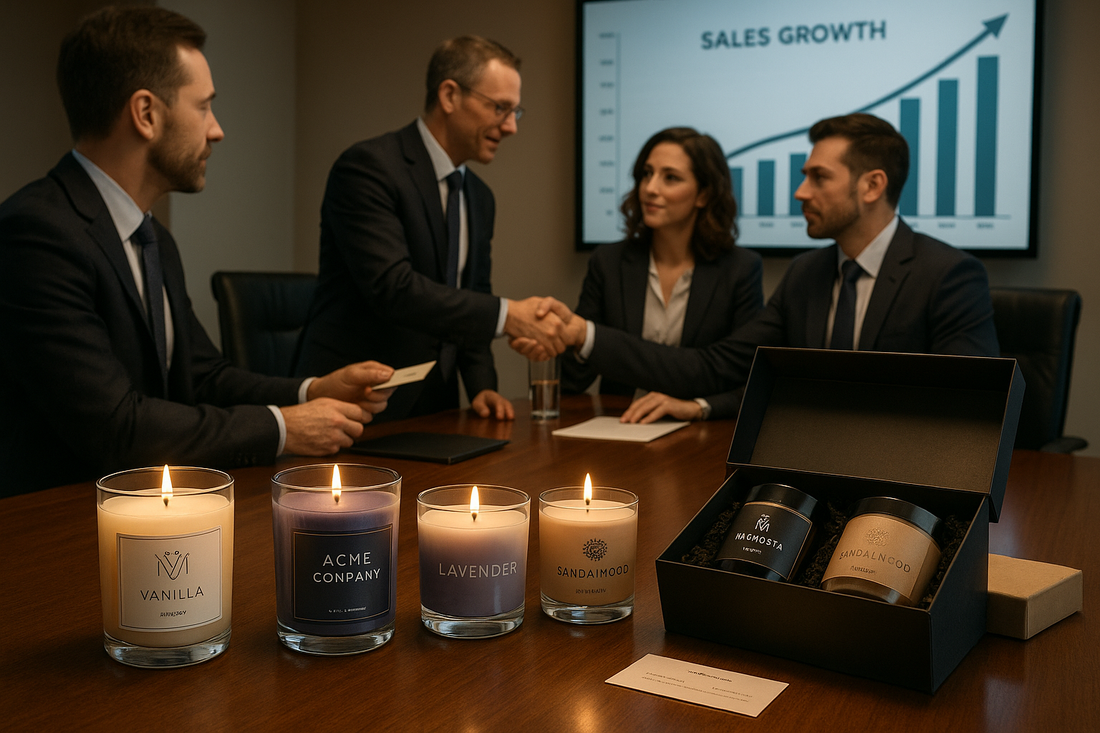
The Growing Demand for Custom Scented Candles in the B2B Market
In recent years, the scented candle industry has grown far beyond home décor. Today, businesses across hospitality, retail, and corporate gifting recognize the power of fragrance as a tool to shape brand identity and create memorable experiences. For B2B buyers, custom scented candles are no longer just decorative products—they have become strategic assets.
Why Scented Candles Appeal to Businesses
Scent has a unique ability to evoke emotions and trigger memories. When hotels, spas, or boutiques use signature scents, they establish stronger connections with customers. Unlike mass-produced candles, customized options allow businesses to align fragrance with their branding, whether that means lavender for calmness, citrus for energy, or woodsy notes for sophistication.
Beyond hospitality, companies use candles as high-value promotional products. A carefully designed candle with a logo or packaging tailored to the brand leaves a lasting impression, far beyond the lifespan of a typical giveaway item.
Shifts in the B2B Candle Market
The B2B market is experiencing several key shifts:
Focus on Sustainability – Buyers increasingly request eco-friendly waxes, recycled glass containers, and biodegradable packaging.
Smaller MOQs – Instead of bulk orders only, suppliers now offer lower minimums to attract startups and boutique brands.
Flexible Customization – From fragrance blends to container design, businesses seek more control over product identity.
Hybrid Purchasing Models – Companies combine ready-stock purchases with custom orders, balancing speed and exclusivity.
These shifts highlight an important reality: businesses are not just buying candles; they are investing in branding tools.
What Businesses Look for in a Supplier
For B2B buyers, finding the right supplier goes beyond fragrance quality. They value:
- Consistency – A signature scent must be replicated perfectly in every batch.
- Scalability – Suppliers should accommodate small pilot runs as well as large bulk orders.
- Transparency – Information about materials, safety certifications, and lead times builds trust.
- Support – Consultation on fragrance selection, design, and packaging makes the process smoother.
The Role of Samples and Incentives
Samples play a crucial role in B2B decision-making. Businesses need to test fragrance quality, burn time, and packaging before committing to larger orders. This is why many suppliers now offer free or low-cost samples. Incentives such as first-order discounts also reduce buyer hesitation, especially for businesses exploring a new supplier relationship.
FAQ: Buying Custom Scented Candles for Business
1. Why should my business consider custom scented candles instead of standard retail candles?
Custom candles allow your brand to differentiate itself. Instead of offering what customers can buy anywhere, you present a product with your chosen fragrance, packaging, and message. This enhances brand recognition and adds exclusivity.
2. What are the most popular fragrance profiles for business use?
Fresh and universal scents like lavender, citrus, and vanilla dominate the market. However, businesses increasingly request complex blends—such as sandalwood with amber or green tea with jasmine—to create a signature identity.
3. How do minimum order quantities (MOQs) usually work for custom candles?
Traditionally, suppliers required bulk orders of thousands of units. Today, many B2B suppliers offer lower MOQs, sometimes as few as 100–200 pieces, to support boutique businesses and test orders.
4. How important is sustainability in candle sourcing?
Extremely important. More companies demand soy, coconut, or beeswax options instead of paraffin, along with recycled containers and eco-friendly packaging. Sustainability often influences customer purchasing decisions.
5. What customization options do suppliers usually provide?
Options include fragrance blends, container shapes, glass colors, labeling, logo engraving, and packaging styles. The level of customization depends on the supplier’s production capabilities.
6. Can custom candles be produced quickly for events or seasonal promotions?
Yes, but lead time depends on the complexity of customization. Ready-stock products can ship within days, while fully custom designs may take several weeks. Planning ahead ensures timely delivery.
7. How do I evaluate the quality of a candle supplier?
Request samples and test burn performance, fragrance throw, and container durability. Also check safety certifications and past client reviews. A reliable supplier provides transparency at every stage.
8. What industries benefit the most from custom scented candles?
Hospitality (hotels, resorts, spas), retail stores, wellness brands, and corporate gifting companies use them widely. Increasingly, startups and small brands also integrate candles into their product lines.
9. Are custom candles cost-effective as promotional items?
Yes. While the upfront investment may be higher than standard gifts, candles deliver lasting impact. Customers often reuse jars or remember the fragrance, extending brand recall.
10. How do free samples and first-order discounts help businesses?
They reduce risk. Samples let buyers confirm quality, and discounts make trial orders more affordable. These incentives build trust and encourage long-term partnerships.
The scented candle market is no longer limited to personal use. For B2B buyers, it has become a strategic category that blends branding, customer engagement, and sustainability. By choosing suppliers that offer flexibility, quality, and transparency, businesses can transform a simple product into a powerful brand experience.
As the market evolves, one thing remains clear: fragrance is more than a pleasant detail—it is a business tool with the power to influence perception and loyalty.
